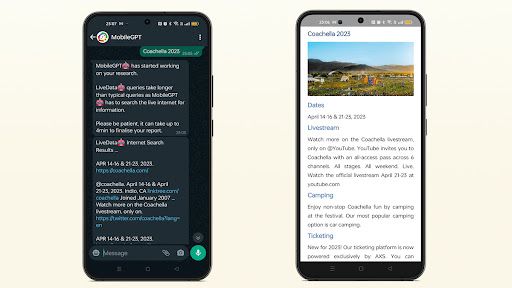Tati Software Launches WhatsApp-based ChatGPT, MobileGPT

A smartphone-based version of ChatGPT called MobileGPT, has been developed by local software development company Tati Software. The software uses OpenAI’s technology to give WhatsApp users access to the chatbot’s artificial intelligence (AI) tools.
According to Tati Software, the AI-powered chatbot gives WhatsApp users access to key features like LiveData search functionality, which generates real-time research reports from the internet, and WhatsApp conversations from text inputs, powered by Stable Diffusion XL Engine.
In order to launch a locally developed version of the service that is aimed at students, learners, and professionals throughout Africa, Tati Software claims it has taken advantage of the original ChatGPT’s publicly available API.
The official ChatGPT is currently only available on a web-based platform. It is constructed on top of the GPT-3 family of big language models from OpenAI and is polished using supervised and reinforcement learning methods. It can engage in conversational conversations, give responses that may seem human, and create on demand text, poetry, or even computer code.
For commercial use cases like optimizing external communications and preparing presentations, local and international businesses have incorporated ChatGPT into their services. Bertha Kgokong, the founder and CEO of Tati Software, stated that MobileGPT aims to bring the generative AI experience within reach of the majority of smartphone and feature phone users across the continent.
The Local GPT
Johannesburg-based Tati Software is a tech startup founded and managed by black women. It creates technologies primarily for underserved African markets. In South Africa, the MobileGPT service is R199 per month, while it is $20 everywhere in the world.
Despite the excitement surrounding AI technologies like ChatGPT, worries have been expressed regarding the requirement for regulation, job losses as a result of automation, and user data security.
Tati Software prioritizes user privacy by not retaining any client information aside from phone numbers, which are required for communication, according to Kgokong. She added that the platform is unable to link a phone number to a specific person because they do not exchange phone numbers with any third parties or gather any other data. There is no storage for generated papers or photos.
https://theouut.com/africa-in-the-digital-age-data-protection-and-privacy-in-focus/
“Regarding job losses, people focus on the idea of jobs that might be lost due to new technologies, and forget the gains to society that technology brings. Maybe industrialisation caused labourers to lose some jobs, but it created engineers, consultants and other more sophisticated jobs, in line with the tech improvements.
“Language models like ChatGPT primarily serve to enhance productivity by significantly reducing the time needed for tasks. The potential of this technology to streamline everyday business processes and enhance communication through AI-driven chatbot integration is immense.”
Tati claims that there are additional advantages to using WhatsApp for the service as opposed to a platform that is purely web-based, such as enhanced interaction and 24/7 accessibility.
The AI Invasion
Open AI has the ability to bring about a wide range of good improvements throughout the continent in industries like healthcare and banking, bridging the gap between inadequate physical infrastructure and consumer expectations, while also freeing up more time for skilled labor and higher labor productivity.
In order for Africans to take advantage of these advantages, African governments, investors, and non-governmental organizations (NGOs) must get ready for the fourth industrial revolution’s transformation of the modern workplace by preparing people for complicated tasks and updating the legal system and educational system to match future needs.
African markets have been stationary in AI development capability for far too long, yet AI is progressing globally and will cause a significant disruption in the near future. Process automation can help organizations to operate on learner models in nations like South Africa where capital and ideas are plentiful. The Tati Software is just another step towards the AI invasion.
